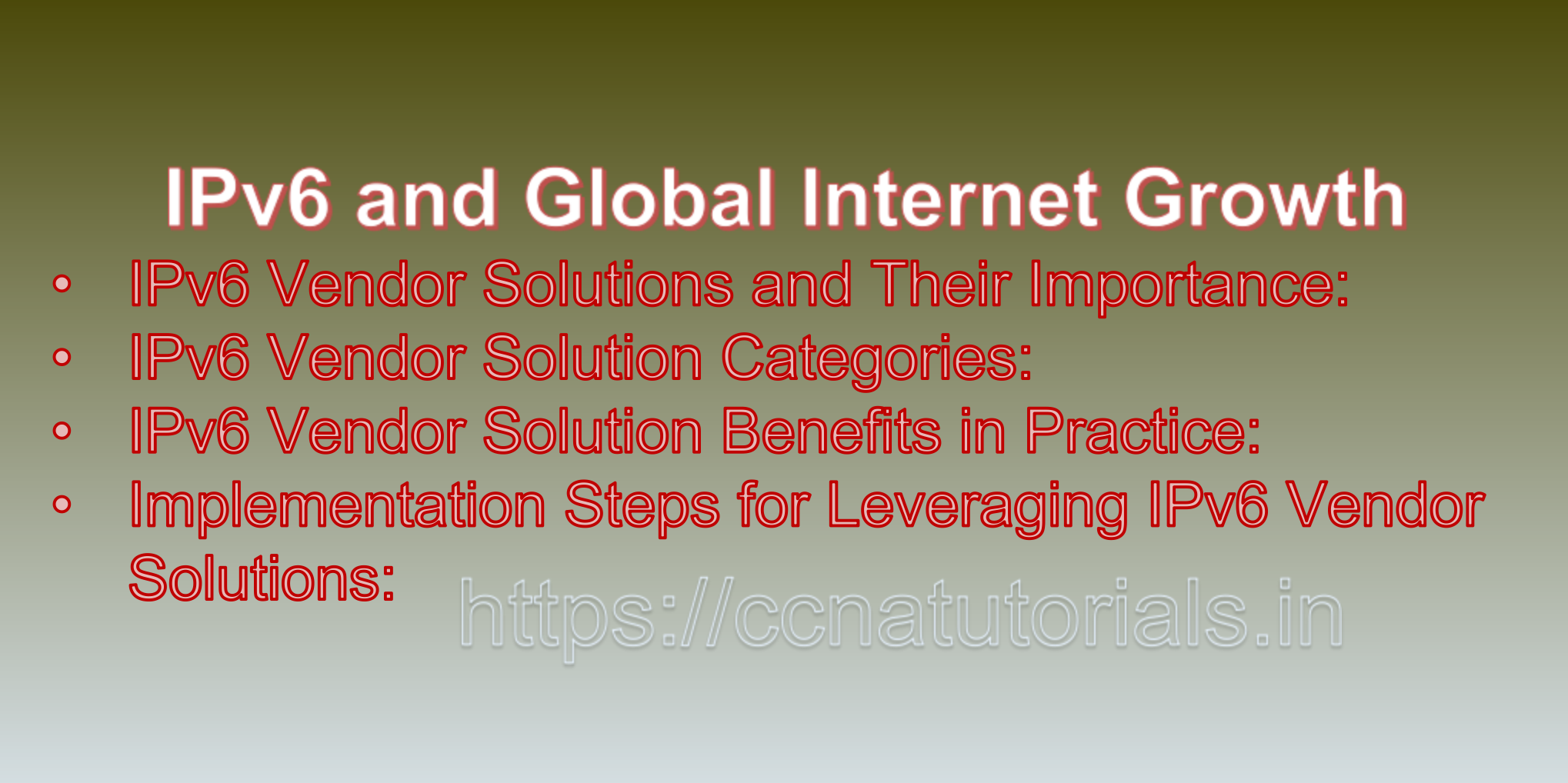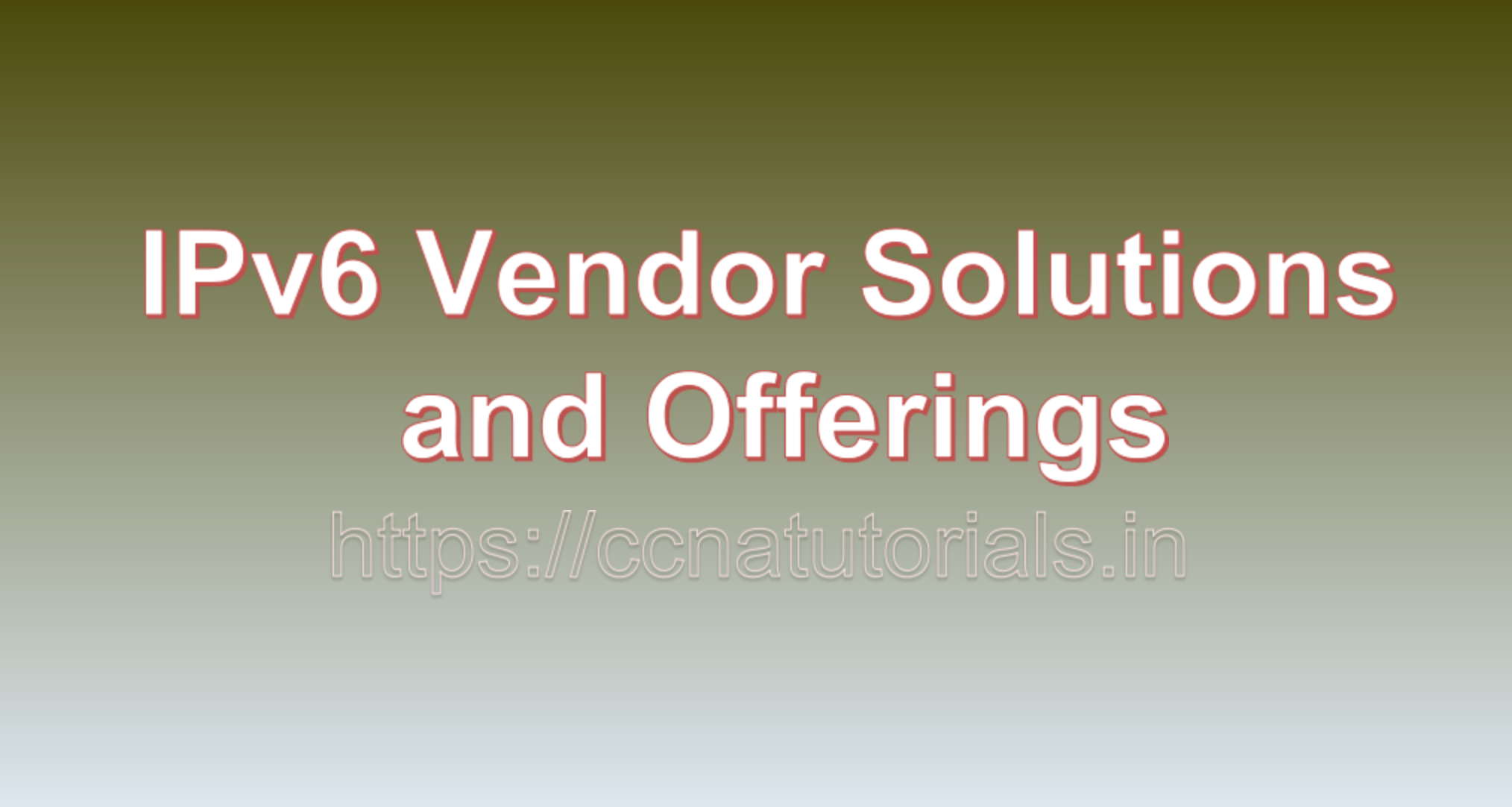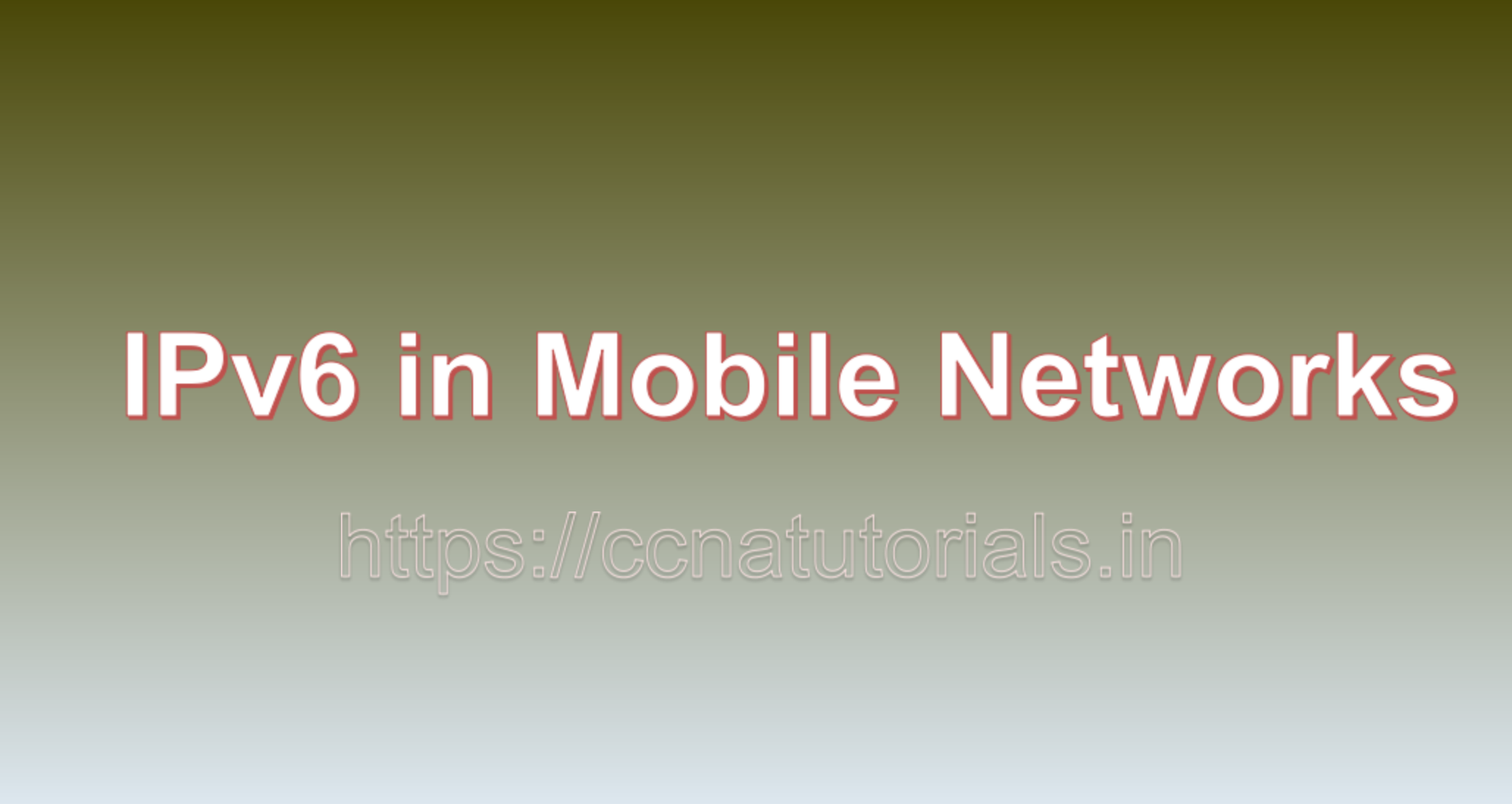Contents of this article
In this article, I describe IPv6 Vendor Solutions and Offerings: Enabling Seamless Transition and Optimization. The adoption of Internet Protocol version 6 (IPv6) brings about significant changes to networking, requiring organizations to explore vendor solutions and offerings that facilitate a smooth transition from Internet Protocol version 4 (IPv4) and leverage the capabilities of IPv6. Vendors provide a range of products and services to address the challenges of IPv6 implementation, from network hardware and software to consulting and training. This article explores IPv6 vendor solutions and offerings, highlighting their significance and providing examples of how organizations can leverage these solutions to successfully embrace IPv6.
1. IPv6 Vendor Solutions and Their Importance:
– Hardware Solutions:
Vendors offer IPv6-compatible routers, switches, firewalls, and other network devices designed to support IPv6’s addressing structure, routing efficiency, and security features.
– Software Solutions:
IPv6-compatible operating systems, applications, and network management tools enable organizations to seamlessly integrate IPv6 into their existing infrastructure.
– Consulting Services:
Vendors provide expert guidance on IPv6 planning, deployment, and migration, helping organizations navigate challenges and make informed decisions.
– Training Programs:
IPv6 training equips IT professionals with the knowledge and skills needed to manage and troubleshoot IPv6 networks effectively.
2. IPv6 Vendor Solution Categories:
– Network Hardware:
– Cisco: Offers a range of IPv6-compatible networking devices, including routers, switches, and firewalls. Cisco’s devices provide comprehensive support for IPv6 features, such as stateless address autoconfiguration (SLAAC) and Internet Protocol Security (IPsec).
– Juniper Networks: Provides IPv6-enabled routers and switches that deliver efficient routing and ensure smooth communication between IPv4 and IPv6 networks.
– Network Software:
– Microsoft: Offers IPv6 support in its operating systems, ensuring that Windows-based devices can seamlessly communicate over both IPv4 and IPv6 networks.
– Linux: Provides IPv6 support in various distributions, enabling Linux-based systems to participate in IPv6-enabled networks.
– Security Solutions:
– Palo Alto Networks: Offers next-generation firewalls with IPv6 support, ensuring that security measures extend to IPv6 traffic as well.
– Fortinet: Provides IPv6-compatible security appliances that offer protection against threats for both IPv4 and IPv6 traffic.
– Cloud Services:
– Amazon Web Services (AWS): Provides IPv6 support for its cloud-based infrastructure, allowing organizations to deploy IPv6-enabled resources.
– Microsoft Azure: Offers IPv6 support for its cloud services, enabling organizations to create IPv6-enabled virtual machines and resources.
– Consulting and Training:
– Global IT Consultancies: Firms like Deloitte, Accenture, and PwC offer consulting services to assist organizations in planning and executing IPv6 deployments.
– IPv6 Forum Certified Training Centers: These centers provide IPv6 training programs that cover various aspects of IPv6 implementation, from basics to advanced strategies.
3. IPv6 Vendor Solution Benefits in Practice:
– Network Upgrade with Hardware Solutions:
– Scenario: A medium-sized enterprise aims to upgrade its network to IPv6 to accommodate its growing number of devices. The organization opts for Cisco’s IPv6-compatible routers and switches.
Outcome:
– The enterprise deploys routers and switches that efficiently handle IPv6 traffic and provide seamless communication across IPv4 and IPv6 networks.
– The hardware solutions simplify the transition process, ensuring that the network is optimized for both protocols and supporting the organization’s growth.
– Cloud Services Integration:
– Scenario: An e-commerce company migrates its online platform to the cloud. To ensure its services are accessible over IPv6, the company chooses AWS for its IPv6-compatible cloud infrastructure.
Outcome:
– The company’s online services are accessible to users on IPv6 networks, expanding its reach and potential customer base.
– By leveraging AWS’s IPv6 support, the company ensures a seamless transition to the cloud while maintaining connectivity for both IPv4 and IPv6 users.
– Expert Consulting for Migration:
– Scenario: A government agency plans to migrate its complex network infrastructure to IPv6. The agency partners with a reputable IT consultancy for expert consulting services.
Outcome:
– The consultancy assists the agency in creating a comprehensive IPv6 migration plan, addressing potential challenges and ensuring a smooth transition.
– The agency’s migration process is well-organized, and potential pitfalls are mitigated with the guidance of experienced consultants.
4. Implementation Steps for Leveraging IPv6 Vendor Solutions:
– Assessment:
Evaluate your organization’s needs and current network infrastructure to determine which vendor solutions align with your goals.
– Vendor Selection:
Choose vendors that offer comprehensive IPv6 support in the form of hardware, software, services, or training, depending on your requirements.
– Integration Planning:
Develop a detailed plan for integrating the chosen vendor solutions into your existing network infrastructure.
– Deployment and Testing:
Implement the selected solutions in a controlled environment and conduct thorough testing to ensure compatibility and functionality.

In short IPv6 Vendor Solutions and Offerings: Building IPv6-Enabled Networks with Vendor Solutions:
IPv6 vendor solutions and offerings are essential for organizations seeking a successful transition to IPv6 and the optimization of their network infrastructure. From hardware and software solutions that support IPv6 features to consulting and training services that guide organizations through the migration process, vendors play a crucial role in enabling the adoption of IPv6. As organizations worldwide recognize the significance of IPv6 in accommodating the growing number of devices and services, leveraging vendor solutions ensures that they can embrace IPv6’s capabilities while maintaining a robust and future-ready network infrastructure.
IPv6 Vendor Solutions and Offerings: Navigating the Transition to a New Internet Era
The adoption of Internet Protocol version 6 (IPv6) is becoming increasingly crucial as the limitations of Internet Protocol version 4 (IPv4) become evident in the face of growing internet-connected devices. IPv6 introduces a wide range of benefits, including an expansive address space, enhanced security features, and improved routing efficiency. As organizations embrace IPv6, various vendors provide solutions and offerings to facilitate a smooth transition. This article explores IPv6 vendor solutions and offerings, illustrating how these options help organizations navigate the complexities of IPv6 adoption.
1. Vendor Solutions and Their Significance:
– IPv6-Ready Networking Equipment:
Vendors offer networking equipment such as routers, switches, and firewalls that are IPv6-compatible. These devices enable organizations to build IPv6-enabled networks without replacing their entire infrastructure.
– IPv6 Deployment Services:
Vendors provide professional services to assist organizations in planning, designing, and implementing IPv6 networks. These services ensure a seamless transition while addressing specific challenges.
2. Benefits of IPv6 Vendor Solutions:
– Efficient Implementation:
IPv6-ready equipment and services streamline the deployment process, minimizing disruptions and ensuring efficient adoption.
– Future-Proofing:
IPv6 solutions prepare organizations for the increasing number of devices and the growth of the Internet of Things (IoT).
– Enhanced Security:
IPv6-compatible devices often incorporate advanced security features, safeguarding organizations’ data and communication.
3. IPv6 Vendor Solutions and Offerings:
– Cisco:
– Solution: Cisco offers a range of IPv6-compatible networking devices, including routers, switches, and security appliances.
– Offering: Cisco provides IPv6 training and certification programs to equip professionals with the skills needed to design, implement, and manage IPv6 networks.
– Juniper Networks:
– Solution: Juniper Networks delivers routers, switches, and security devices designed for IPv6 environments.
– Offering: Juniper offers deployment services to help organizations seamlessly integrate IPv6 into their networks, ensuring a smooth transition.
– Huawei:
– Solution: Huawei provides a portfolio of networking solutions, including routers, switches, and access points, all designed to support IPv6.
– Offering: Huawei offers IPv6 training courses to educate IT professionals on IPv6 fundamentals, addressing, and deployment strategies.
– Palo Alto Networks:
– Solution: Palo Alto Networks offers next-generation firewalls with built-in IPv6 support to ensure secure communication for both IPv4 and IPv6 traffic.
– Offering: Palo Alto Networks provides resources and guidance on IPv6 migration strategies, helping organizations adopt IPv6 without compromising security.
4. Examples of IPv6 Vendor Solutions in Action:
– Enterprise Network Upgrade:
– Scenario: A medium-sized enterprise decides to upgrade its network infrastructure to accommodate the growing number of devices. The organization opts for a solution from a leading networking vendor that offers IPv6-compatible routers and switches.
Outcome:
– The organization acquires networking devices designed to seamlessly support both IPv4 and IPv6 traffic.
– The IT team deploys the new equipment, enabling the organization’s devices to communicate using IPv6 addresses.
– The enterprise experiences a smooth transition, with minimal disruptions to network services.
– Telecom Provider’s IPv6 Deployment:
– Scenario: A telecommunications provider recognizes the importance of IPv6 in supporting the increasing number of connected devices. The provider partners with a network solutions vendor that offers IPv6 training and consultation services.
Outcome:
– The telecommunications provider’s network engineers undergo IPv6 training, gaining the expertise needed to design, implement, and troubleshoot IPv6 networks.
– The network engineers work closely with the vendor’s experts to develop a comprehensive IPv6 deployment plan.
– The telecommunications provider successfully migrates its core network to IPv6, ensuring optimal communication and future scalability.
5. IPv6 Vendor Solutions: Considerations and Implementation Steps:
– Assessment:
Evaluate your organization’s networking infrastructure, identifying the areas that require IPv6 compatibility and support.
– Vendor Evaluation:
Research vendors that offer IPv6 solutions, assessing their product offerings, professional services, and reputation within the industry.
– Planning:
Collaborate with the chosen vendor to develop an IPv6 migration strategy tailored to your organization’s needs and goals.
– Implementation:
Deploy IPv6-compatible networking equipment and services according to the plan, ensuring proper integration and testing.
– Training:
If necessary, enroll IT professionals in IPv6 training programs provided by the vendor to ensure they have the required knowledge and skills.
6. Benefits of IPv6 Vendor Solutions:
– Efficiency:
Vendor solutions streamline the IPv6 adoption process, reducing implementation time and minimizing disruptions to network services.
– Expertise:
Vendors bring specialized knowledge and experience, ensuring that the deployment and management of IPv6 networks are carried out effectively.
– Support:
Organizations can rely on vendor support for troubleshooting, updates, and guidance throughout their IPv6 journey.
Conclusion for IPv6 Vendor Solutions and Offerings: Leveraging Vendor Solutions for Successful IPv6 Adoption:
The transition to IPv6 is an essential step for organizations looking to address the limitations of IPv4 and support the growing demands of the digital age. IPv6 vendor solutions offer a range of networking equipment, services, and expertise to ensure a smooth and efficient transition. By leveraging these solutions, organizations can build robust and future-ready network infrastructures that accommodate the increasing number of devices, enhance security, and streamline communication. As the networking landscape evolves, partnering with reputable vendors provides the guidance and tools necessary to navigate the complexities of IPv6 adoption successfully.






